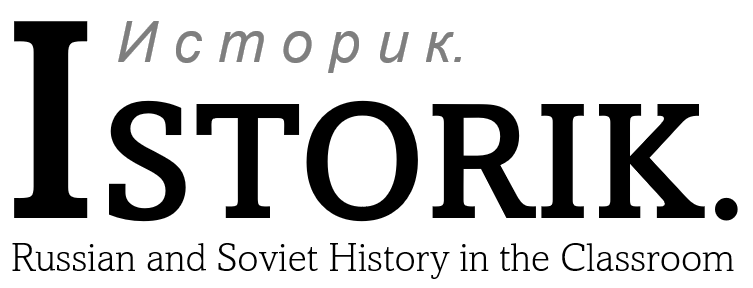It’s not uncommon to hear teachers complain about the work they have to do that just isn’t in the job description – sports coach, administrator, photocopier mechanic… The list might seem endless. Well, how about adding to that language tutor?
In this post, I’d like to make the case that, when teaching
Russian and Soviet History, we should be teaching aspects of its language to
students as an important element of our work – whether or not it’s part of the
job description. This is certainly not to claim that only Russian speakers can,
or should be able to, teach Russian and Soviet History. In fact, if we’re
teaching the basics of Russian and Soviet History well, we’re all probably
doing lots of this already.
Teaching
Pronunciation
How can you use a word if you can’t say it? One of my most
unpleasant classroom surprises came a few years ago, when I asked a Year 8 girl
to read the word “Protestant” after several weeks of teaching the Reformation.
When she pulled a startled blank, I realised I’d never asked her – or in fact
any other students in that class – to practice saying the word (I’d simply
assumed they could, and that they knew what it meant from the context of the
lessons).
When teaching Russian History, the challenge in
pronunciation is dialled up a notch. How can students expect to know how to use
the following words, either in a classroom or essay, if they can’t pronounce them?
Some mono- or duo-syllabic words might seem relatively
straightforward:
- Duma
- Zemstvo
- Pogrom
- Tsarism
Others may seem less so:
- Konstantin Pobedonostsev
Students need to hear these words said clearly and regularly by us, the experts in the room. But they probably also need to be saying them regularly themselves. After observing a language lesson (and in response to my own unpleasant “Protestant” experience), I began to get students to hear and chant back to me particular terms in lessons to get used to saying them, in addition to requesting they use them in speech during class discussions. Each year, it takes about 3 or 4 lessons of coming back to and verbally repeating, on and off, the name Konstantin Pobedonostsev for everyone to crack it. It’s time well spent.
If you’re unfamiliar with certain Russian names and sounds, there are some easy fixes:
Look up the word or name on Wikipedia – there will usually
be a Cyrillic-script original and a Latin phonetic transcription there.
Go to Russian pronunciation guides for letters and
combinations that are obviously un-English – for example here.
Hear others saying the words and names, for example on
YouTube – but beware that not all pronunciations here are accurate!
Tracing
Etymology and Morphology
Where words come from and how they’re constructed matters –
and it helps reveal a world of meaning behind each one.
Using Russian language terms can enable us to highlight the
concepts and origins underpinning them. Consider the following.
|
Term |
Meaning |
Origin |
|
Mir |
Peasant
commune, organisation regulating peasant life in villages |
Mir
also means “peace”, “world”, and “universe”, a reminder that many peasants
saw their existence before 1917 as rooted in their immediate surroundings |
|
Soviet |
Council,
including revolutionary councils elected by workers, soldiers, and peasants
in 1905 and 1917 |
Soviet
had been used before 1905 and 1917 to describe councils, including in
government. Its stem lies in the words for advice, council, and assembly |
|
Pogrom |
A violent
attack, usually targeting Jews and Jewish property |
Derived from
verb pogromit’, meaning to destroy or wreak havoc through violence.
Its use is now most commonly associated with anti-Jewish violence, although
in late-imperial and Soviet Russia it was also used to describe mass violent
attacks more generally |
Unless a native Russian speaker, no-one can be expected to have
a full prior grasp of the etymology and morphology of Russian words. Where do
we go to fill in gaps in our own knowledge? Sometimes, textbooks include useful
snippets on the origins of terms. The online etymological dictionary, Etymonline,
however, has a much wider and more extensive range of terms and their origins.
Expressing
Unique Ideas
Finally, it’s worth considering how far words translate
effectively from one language to another. Terms for concrete everyday objects,
such as “cat”, “house”, or “tree” generally do, although these aren’t really
the non-English words we’d choose to use in a History classroom. Words denoting
more abstract or context-specific concepts often don’t. This means that many
words in original Russian denote a meaning that just isn’t captured by an English
equivalent.
No need to start with a Russian word here – if you’re
familiar teaching the History of Nazi Germany, just think about Fuhrer, Volksgemeinschaft,
or Endlosung. These terms – translatable as “leader”, “People’s
Community”, and “Final Solution” – do have English translations, none of which carry
the conceptual baggage that the original German does.
If we can’t express an idea in a translation, it may be best
not to try. A Russian-language original backed up with discussion of its
etymology or contextual use is likely to be a much better shout. In any case,
we’re probably doing this for a lot of words already (e.g. “Workers elected
their soviets in 1917”, “A spate of violent pogroms
broke out after Alexander II’s assassination in 1881”, etc.).






No comments:
Post a Comment